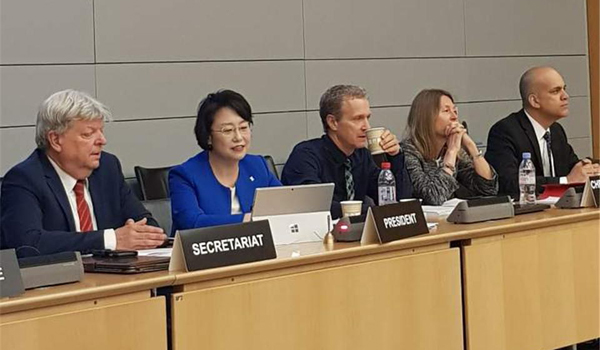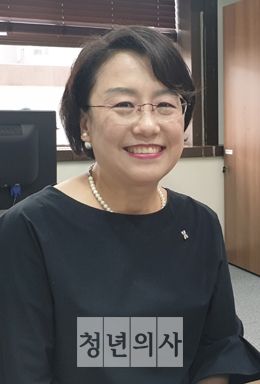HIRA Executive Director Kim explains paradigm shift at her HCQO Working Group
It is often said that medical professionals should provide healthcare services not from the viewpoint of suppliers but those of patients. An increasing number of medical institutions are also grafting patient experiences and service designs to medical fields. Still all these are within the framework of “healthcare provision.”
Other countries, however, have begun to assess the “quality of healthcare” in patient-centered ways, too. It is also an agenda item under active discussion at the Organization for Economic Cooperation and Development. Besides, OECD is arguing about the issue of “putting people at the center of healthcare.”
Kim Sun-min, executive director of planning at the Health Insurance Review and Assessment Service (HIRA), has been experiencing these changes while working at OECD’s Health Care Quality and Outcome (HCQO) Working Group over the past decade. HIRA has represented Korea at HCQO Working Group since 2007, and Executive Director Kim joined it in 2009. Doctor-turned-administrator Kim was elected as the chairperson of the HCQO Working Group last year, for the first time in Asia and for the first time among women, and has since been chairing the group.
HCQO Working Group was established in 2001 under the wing of OECD’s Health Committee and is responsible for developing, collecting and comparing the outcomes of healthcare from the aspect of the quality of healthcare. Sixty experts from 36 OECD member nations are taking part in the group.
HCQO Working group develops and compares indicators by taking into account comparability and policy implication and provides them for member countries as opportunities to benchmark. Besides, the data produced by HNQO Working Group is used as the basis of making policies to improve the quality of national healthcare.

‘Paradigm has already been shifted to patient-centered direction’
In a recent interview with Korea Biomedical Review, Executive Direct Kim said the issues discussed in OECD used to center on clinical effectiveness previously, but the focus has recently been shifted to patient-centered debates. Kim said Korea is lagging behind others in this trend.
Korea introduced patient experience assessment in 2017, but the general trend in this country remains at judging the quality of healthcare based on clinical effects. However, many OECD countries have shifted to a patient-centered assessment of healthcare quality, and discussions about the issue are briskly underway within the club of industrial countries.
OECD has begun to conduct Patient-Reported Indicator Survey (PaRIS), in which it develops patient-reported indexes, gather the measurement results of member nations and compared them. Also, discussions are being made briskly about Patient Reported Experience Measurement (PREMs), Patient Reported Outcome Measurement (PROMs), and Patient-Reported Incident Measurement (PRIMs).
In the OECD health ministers’ meeting held on Jan. 17, 2017, the participants adopted a declaration, which said Putting People at the Center of Health Care should be the future direction of global healthcare. Health ministers from member countries also proposed to produce and submit statistical indicators, which will be used for measuring “patient experiences and results,” until they meet again five or six years later.
“It seems as if these trends are not parts of the overall assessment of healthcare quality, but they are opening a new horizon,” Executive Direct Kim said.
In the interview with this paper, Kim explained about major issues discussed in her working group.
“In OECD, too, the discussion centered on clinical effectiveness, including the mortality rate, at first. Those were the supplier-centered discussions, in other words. Then they began to change to a patient-centered paradigm,” Kim said. “In the beginning, Korea seemed to go ahead armed with abundant information on clinical effectiveness, but now OECD is well ahead of Korea, as patient-centered evaluation has become the dominant trend.”
Executive Director Kim stressed the need to pay attention to the fact that Professor Michael E. Porter, a world-renowned management guru, gave a keynote address, at the 2017 OECD High-Level Policy Forum held with the theme of “People at the Center: The Future of Health,” on Jan. 16, a day before the health ministers’ conference.
Kim summed up Professor Porter’s speech, entitled “The Strategy to Transform Health Care and The Role of Outcomes,” as follows.
“Have doctors ever thought about how patients would accept medical technology to extend their lives by three months at the cost of several millions of dollars? Doctor claim they have lowered the mortality rate through hard work but have they shown interests in the patients’ quality of life? After all, patients should be at the center of interpreting all these issues and make decisions.”
Kim noted that people used to think high costs guarantee healthcare quality. However, she said, discussion began whether it is appropriate to make healthcare costlier from the viewpoint of patients. If the medical expenses continue to go up, there will come a time in Korea, too, when related parties begin to discuss whether it is worthwhile to spend such high costs from the viewpoints of patients.
“In other countries, they began to ask about patients’ safety. Although it is in the beginning stage, much is changing drastically,” the HIRA executive director said. “Korea is good at evaluating the clinical effectiveness, including the mortality rate, but is still unfamiliar with asking questions to patients.”
Pointing out that “these are changes not in techniques but paradigms,” Kim stressed the need for Korea to accept them more positively. Korea has caught up with advanced countries painfully, but the nation still has a lot to benchmark, Kim said, adding that she would like to work more positively to let Korea learn about these issues this year.
OECD pays attention to ‘low value care’
Another concern of OECD is to reduce “low value care.” It aims to cut down on unnecessary care that has little to do with the quality of healthcare. Some member countries, including the United States, have specified low value care for related academic societies for them to share these with medical professionals and patients.
“In the U.S., about 100 related academic societies have selected 10 low value care each in their areas and share them with members since five to six years ago. They also make the patient versions of such information separately and share them,” Kim said. “The medical community has taken the lead in doing this work, rather than being forced by the government.”
Noting that OECD is discussing the issue of making low value care indexes and will do so shortly, Executive Direct Kim cited as such examples measuring the share of conducting MRI scans on people with a back problem, or that of administering antibiotics to cure a cold. Kim said she understands Korean academic societies are taking part in such discussions overseas.
“Globally, the viewpoint of healthcare quality is shifting from supplier-centered to patient- and people-centered pattern. Their evaluation is also changing from clinical effectiveness to patient- and people-oriented viewpoints,” she said. “That is also the direction in which Korean healthcare should move.”
The HCQO chairperson said her group would also focus on developing indexes aimed to strengthen the patient-centered healthcare system.
“HCQO Working Group develops and gathers indicators that are highly comparable among member nations. The domains of these indexes are continuing to expand to patient safety, hospital performances and others,” Kim said. “Notably, we will make extensive efforts to develop Patient-Reported Indicators, to enhance patient-centered healthcare system.”
Executive Director Kim also expressed her intention to reinvigorate discussions at HCQO Working Group this year while she takes its chair.
“I will not stop at demanding the submission of data for statistical analysis but spend more time on sharing related policies of member nations and holding meetings to discuss them,” Kim said. “I will also take part in other related meetings to share and spread what happens at HCQO.”
The HCQO chairman went on to say, “I will work hard to spread more of the discussions being made at OECD to Korea, and train my juniors so that they can make brisk activities in international stages.”


